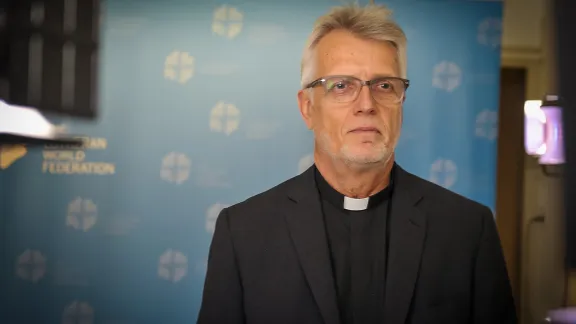
LWF General Secretary Martin Junge addressed the Faith for Nature conference which is taking place in Skálholt, Iceland, via video stream. Photo: LWF/S. Gallay
LWF General Secretary addresses "Faith for Nature" conference
(LWI) - The survival of humankind as "created creatures in a created world" will depend "how we might seek fulfillment in life in gifts and resources that are not for sale," said Rev. Dr. Martin Junge, General Secretary of The Lutheran World Federation (LWF). He addressed the Faith for Nature conference taking place in Skálholt, Iceland, from 5 to 8 October via video stream.
The conference aims at identifying the “way forward in mobilizing values, ethics, spirituality, and faith-based action" to achieve the UN sustainable development goals (SDGs). It strives to empower faith-based organizations (FBOs) to take action for the SDGs and to cooperate for sustainable and regenerative development, aiming to endorse the establishment of a global Faith for Earth Coalition.
“Faith has so much to offer to get that conversation going,” Junge reflected. “Faith knows how to address existential questions and challenges. Faith knows to draw horizons of hope and have communities witnessing to that hope.”
Faith knows how to address existential questions and challenges. Faith knows to draw horizons of hope and have communities witnessing to that hope.
The interconnection between Christian faith, climate justice, and the SDGs is reflected in the parable of the good shepherd (Matthew 18:12-14) with its message "to leave no-one behind," Junge pointed out. Today, "any paradigm that calls itself 'development' must promote social and biological diversity and be based on inclusion. If only one bird is missing, one plant, one animal, if only one person is missing, or entire groups are missing, we are not complete."
The LWF general secretary named several engagements of the communion of churches that touch on the issue. “Our commitments to gender justice, inclusive, participatory societies, the common good in political and economic sectors, climate justice, adaptation, and mitigation are strands of one green or holistic ecology of justice and peace,”
At the same time “we need to widen our perspective and work with an eco-centric framework,” because much of the traditional theological discourse has been “centered around the human being, and often seen in isolation from the created world.”
Also, Junge affirmed a “constructive dialogue between the sciences: natural, social, political, and theological.” He went on to say that “the task of discerning morally sound political, economic, and technological pathways to sustain life within planetary limits, requires that we learn to see theology and the natural sciences, faith, and reason, as belonging to one ecology of human wisdom.”
Interfaith cooperation adds value to the efforts for climate justice of the LWF and its member churches, Junge said. "I see the Faith for Earth Coalition as a needed extension of the many concrete experiences of cooperation at a local level, precisely to link up local and global action." The rootedness of FBOs now needed "traction at the global policy discussion." He endorsed the approach of the Faith for Earth Coalition to support the possibility of such an exchange.
The co-hosts of the Faith for Nature conference are the United Nations Environment Program's (UNEP) Faith for Earth Initiative, the Evangelical Lutheran Church of Iceland, the Icelandic government, and other Icelandic organizations. Held a few months before the fifth United Nations Environment Assembly planned for February 2021 in Nairobi, the conference relates to the overall theme "Strengthening Actions for Nature to Achieve the Sustainable Development Goals."


